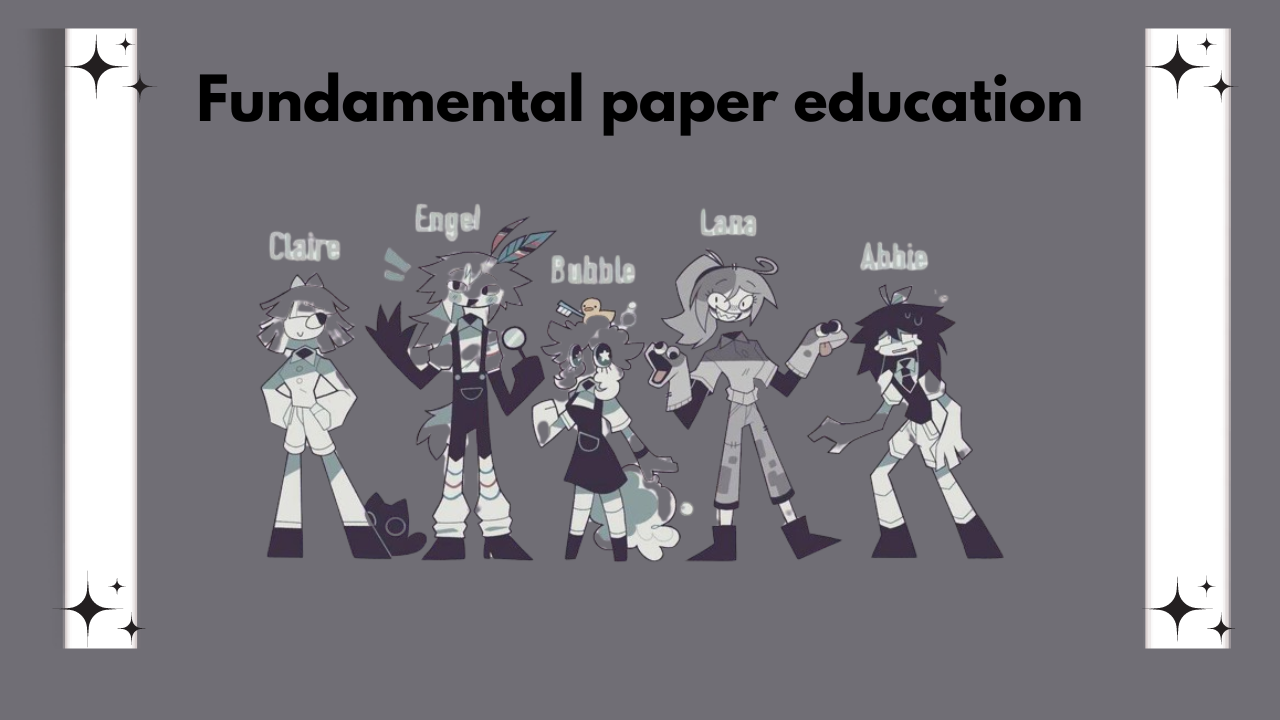Introduction
The realm of education is continually evolving, and staying abreast of the foundational theories and key research papers is essential for educators, researchers, and policy-makers. With the rise of digital media, web series have emerged as a powerful medium for disseminating educational content, including fundamental papers education. This comprehensive exploration will discuss how web series are used to present and analyze critical educational theories and research, highlighting key examples and the benefits of this modern approach to educational dissemination.
The Role of Web Series in Fundamental Paper Education
Evolution of Educational Content Delivery
The delivery of educational content, particularly in fundamental paper education, has evolved dramatically over the years. Traditionally, students and scholars relied on textbooks, lectures, and academic journals to gain insights into fundamental paper education. However, with the rise of digital technology, new platforms have emerged. Among these, web series have become an influential medium, offering a dynamic and accessible way to delve into complex educational topics. Web series, which are episodic content delivered via the internet, provide a fresh approach to exploring the intricacies of fundamental paper education.
Why Web Series for Fundamental Paper Education?
- Accessibility: Web series dedicated to fundamental paper education are accessible from various devices, making this critical educational content available to a global audience.
- Engagement: The episodic format and multimedia presentation of web series can make the complex theories and concepts within fundamental paper education more engaging and easier to grasp.
- Flexibility: Viewers can watch episodes at their convenience, allowing for self-paced learning that is particularly beneficial for those studying fundamental paper education.
- Interactivity: Some web series offer interactive elements like quizzes and discussion forums, enhancing the understanding and application of fundamental paper education.
Benefits of Using Web Series
- Accessibility: content presented through web series is accessible from various devices, broadening the reach to a more diverse audience.
- Engagement: The episodic nature and multimedia elements of web series can make the theories and concepts more engaging and easier to comprehend.
- Flexibility: Learners studying can consume content at their own pace, with the option to revisit episodes as needed for deeper understanding.
- Interactivity: Many web series focused on fundamental paper education offer interactive features, such as quizzes and discussion forums, which enhance the overall learning experience and facilitate better retention of complex material.
Web series are increasingly recognized for their ability to make fundamental paper education more accessible, engaging, and interactive. As the educational landscape continues to evolve, the role of web series in delivering high-quality, content will likely expand, providing learners with valuable tools to better understand and apply essential educational theories and practices.
Fundamental Papers Education: Key Theories and Research
To understand the value of web series in presenting educational theories, it is crucial to explore some of the fundamental papers and their influence on modern educational practices.
1. Jean Piaget’s Theory of Cognitive Development
Key Papers:
- “The Language and Thought of the Child” (1923)
- “The Origins of Intelligence in Children” (1952)
Overview: Jean Piaget’s work on cognitive development introduced a stage-based model of how children acquire knowledge and understanding. His theory posits that cognitive development occurs in four stages:
- Sensorimotor Stage: Birth to 2 years, where infants learn through sensory interactions and motor activities.
- Preoperational Stage: 2 to 7 years, characterized by symbolic thinking and egocentrism.
- Concrete Operational Stage: 7 to 11 years, involving logical thinking about concrete objects.
- Formal Operational Stage: 12 years and up, where abstract and hypothetical reasoning develops.
Web Series Application: A web series on Piaget’s theory could include animated sequences depicting each stage of cognitive development, interviews with child psychologists, and practical examples of how these stages manifest in educational settings. Interactive elements, such as quizzes on cognitive stages, could help viewers apply Piaget’s theories to real-world scenarios.
2. Lev Vygotsky’s Sociocultural Theory
Key Papers:
- “Mind in Society: The Development of Higher Psychological Processes” (1978)
Overview: Lev Vygotsky’s sociocultural theory emphasizes the role of social interaction and cultural context in cognitive development. Key concepts include:
- Zone of Proximal Development (ZPD): The difference between what a learner can do independently and what they can achieve with guidance.
- Scaffolding: The support provided by teachers or peers to help learners achieve tasks within their ZPD.
Web Series Application: A web series based on Vygotsky’s theory could feature episodes focusing on practical applications of ZPD and scaffolding in classrooms. For instance, episodes could illustrate classroom scenarios where teachers use scaffolding techniques to support student learning. Interviews with educators who implement Vygotskian methods could provide insights and real-world applications.
3. John Dewey’s Progressive Education
Key Papers:
- “Democracy and Education” (1916)
Overview: John Dewey’s progressive education philosophy advocates for an educational approach that is child-centered and experiential. Dewey argued that education should:
- Be Child-Centered: Tailor learning to the needs and interests of students.
- Be Experiential: Emphasize learning through direct experience rather than passive absorption.
- Connect to Society: Relate classroom learning to real-world issues and democratic participation.
Web Series Application: A web series on Dewey’s philosophy could showcase innovative teaching practices, such as project-based learning and student-led initiatives. Episodes could include classroom examples where Dewey’s principles are applied, along with interviews with progressive educators and students reflecting on their experiences.
4. Paulo Freire’s Critical Pedagogy
Key Papers:
- “Pedagogy of the Oppressed” (1970)
Overview: Paulo Freire’s critical pedagogy focuses on education as a tool for social change and empowerment. Key concepts include:
- Dialogical Learning: Education as a collaborative process involving dialogue between teachers and students.
- Conscientization: Developing critical awareness to challenge social injustices and inequalities.
Web Series Application: A web series on Freire’s critical pedagogy could include episodes highlighting real-life applications of dialogical learning and conscientization. This might involve exploring community-based educational projects, interviews with educators involved in social justice initiatives, and discussions on how education can address systemic inequalities.
Notable Examples of Web Series on Educational Theory
1. “CrashCourse”
Overview: “CrashCourse” is a popular educational web series created by John and Hank Green. It offers a range of subjects, including psychology and history, and occasionally touches on educational theories and pedagogical approaches. The series is known for its engaging and concise presentation of complex topics.
Relevance: While not exclusively focused on fundamental papers education, “CrashCourse” often provides valuable context and explanations of educational theories, making it a useful resource for learners interested in understanding these concepts in a broader educational framework.
2. “Edutopia”
Overview: “Edutopia,” produced by the George Lucas Educational Foundation, is a web series that explores innovative teaching practices and educational theories. The series covers various aspects of education, including project-based learning, social-emotional learning, and the application of educational research in classrooms.
Relevance: “Edutopia” frequently highlights fundamental educational theories and practices, showcasing how they are applied in real-world classrooms. It provides practical insights into the implementation of theories from Piaget, Vygotsky, Dewey, and Freire.
3. “The EdSurge Podcast”
Overview: “The EdSurge Podcast” focuses on the intersection of technology and education. While it is not a traditional web series, its episodes often discuss innovative educational practices and research, including insights into how fundamental educational theories are being integrated into modern teaching strategies.
Relevance: The podcast provides an avenue for understanding how foundational educational theories are adapted and implemented in contemporary educational contexts, often featuring interviews with educators and researchers.
Conclusion
Web series have emerged as a dynamic and engaging medium for exploring and understanding fundamental papers education. By presenting complex theories in accessible and interactive formats, web series like “CrashCourse,” “Edutopia,” and “The EdSurge Podcast” make critical educational research more approachable and relevant to a wide audience. As educational content continues to evolve, web series will play a crucial role in disseminating foundational knowledge and fostering a deeper understanding of essential educational theories and practices.
Read our more blogs – How to Videobuddy



